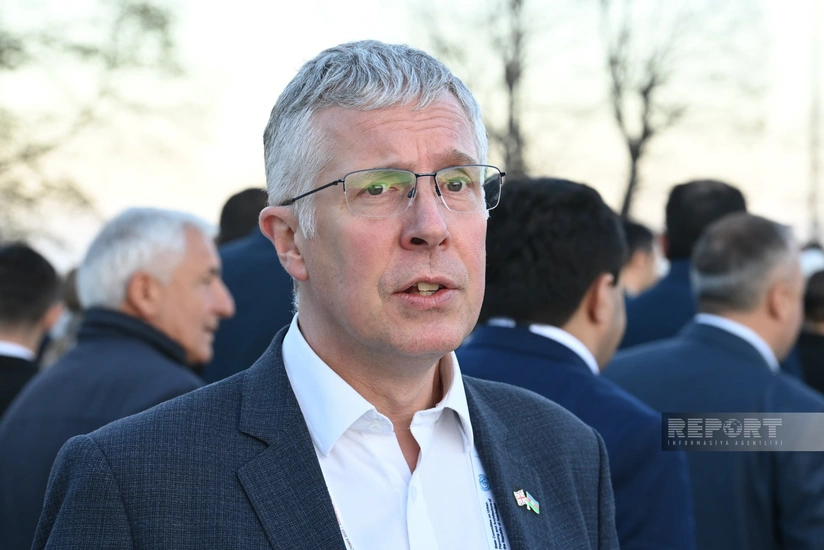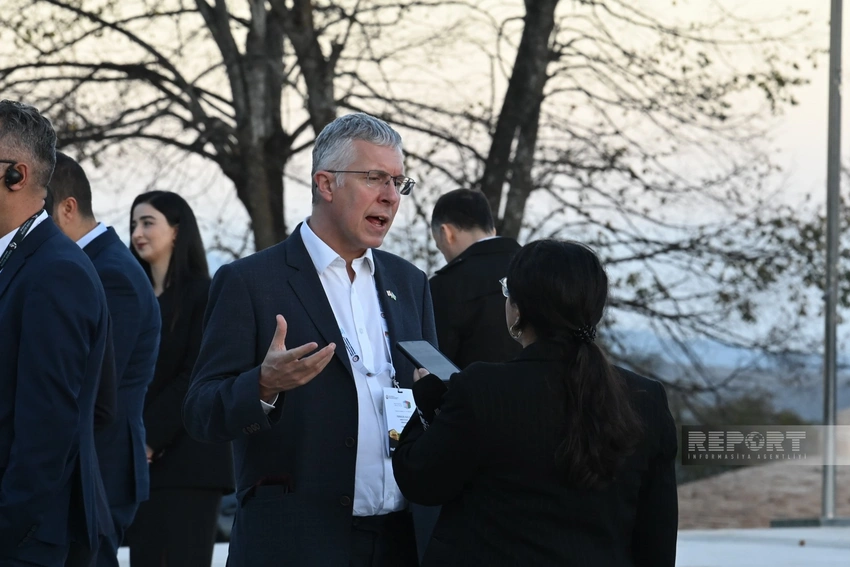Ambassador Fergus Auld: 'The number of Azerbaijani visa applicants to the UK continues to rise' - INTERVIEW
- 17 October, 2025
- 13:05

Relations between Azerbaijan and the United Kingdom are developing rapidly. London consistently expressed its support for Azerbaijan's territorial integrity during the years when the Karabakh conflict existed. BP has played - and continues to play - an important role in the successful implementation of Azerbaijan's oil strategy and in the country's socio-economic development.
The UK Ambassador to Azerbaijan, Fergus Auld, answered Report's questions regarding the peace process with Armenia, as well as the development of political and economic relations between the two countries, and issues related to education and visas.
- How do you evaluate the peace process between Azerbaijan and Armenia?
- Well, I think, as I mentioned to one of your colleagues, I've been here for a little over three years now, and the progress that has been made recently directly between Azerbaijan and Armenia has been fantastic. There were some major steps forward taken in Abu Dhabi and then in Washington. The initialing of the peace agreement was a really big step, as were the agreements on connectivity.
Of course, we would like to see the peace agreement signed as quickly as possible - that would be a real sign to the world that peace is on a sustainable track. But people have already noticed the progress that is being made.
There is also a lot of focus on connectivity and how the UK can support the connectivity agenda - whether that involves helping to channel investment into upgrading the rail network in Nakhchivan or other related areas. There are still a number of steps ahead, but we are really pleased with the political momentum.
- Azerbaijan and other countries are now working on the Middle Corridor. Are UK companies interested in using this corridor, or are there any ongoing discussions with the UK regarding it?
-When we look at the Azerbaijani government's economic diversification agenda, that's something we very much want to support. We see sectors where there is particular growth here and a comparative advantage for UK businesses - such as clean energy, infrastructure, and connectivity.
A few months ago, we concluded the first deal with UK Export Finance, which was in the aviation sector. We see there is also potential in the rail sector, in logistics, and in clean energy. So yes, there is definitely strong UK commercial interest.

- The year is coming to an end. How do you evaluate this year for the political and economic relations between our countries? And what are the priorities for the next year?
-As you know, when our Europe Minister, Stephen Doughty, visited at the end of August, he agreed with His Excellency the President that we would elevate our bilateral relationship to a strategic partnership. That means we are now talking in a substantively new way about what is possible. For decades, we've had a relationship that has felt strategic in many ways, but we still see potential for growth - particularly in trade and investment in both directions.
We very much welcome SOFAZ's announcement last week of a $66 million (£50 million) investment in Gatwick Airport in the UK, for example.
So that's trade and investment. In terms of security and defense, we've also discussed the lifting of the arms embargo, which means we can now expand defense cooperation and potentially defense exports. And then, of course, education, innovation, and digital development are also areas where we see great potential for deeper cooperation.
-When will the meeting of the intergovernmental commission be held?
-We had our Joint Intergovernmental Commission between Azerbaijan and the UK back in April - that's an annual meeting. The next one will be held in Azerbaijan next year, in 2026.
We also held the Strategic Dialogue between our foreign ministries at the end of August. These are the two most important regular government-to-government ministerial meetings. Both have already taken place this year, but we are also looking forward to senior-level visits in both directions.
-The United Kingdom also supports Azerbaijan cooperation in the field of education. How do you evaluate this area, and are there any new projects planned for next year?
-The British Council has been a partner in Azerbaijan for over 32 years and remains a key contributor to educational development here. We focus particularly on training English language teachers across Azerbaijan, building the skills of young researchers, and providing exams - not only IELTS but also professional exams in accounting and law - which help talented Azerbaijanis access diverse career opportunities. We worked with the Ministry of Science and Education on an English Language Strategy and look forward to implementing it. We are also keen to strengthen university-to-university ties, especially in research and dual-degree programs - such as the one between the University of Warwick and the Azerbaijan State Oil and Industry University. And of course, we are delighted with the growing number of talented young Azerbaijanis studying in the UK. There are many components to our educational partnership, and it truly stands out as one of the defining features of the UK–Azerbaijan relationship.
- My last question is about visas. Are there any discussions about visa facilitation or easing consular services for Azerbaijani citizens?
-We are due to hold consular consultations in London at the end of October, with several Azerbaijani counterparts participating. While there are no immediate new initiatives to announce, we are always keen to hear feedback on how things are working.
The number of Azerbaijani visa applicants to the UK continues to rise, and we are pleased that so many Azerbaijanis are interested in coming to the UK - whether for tourism, education, or business.
